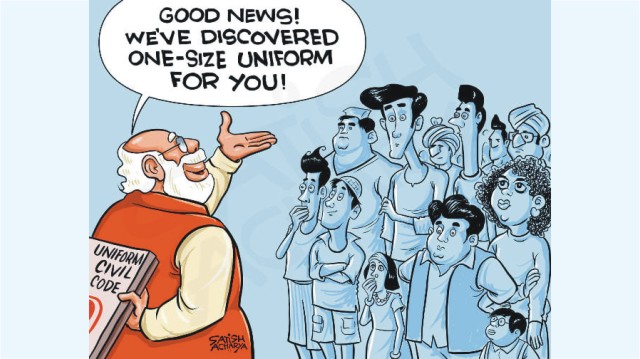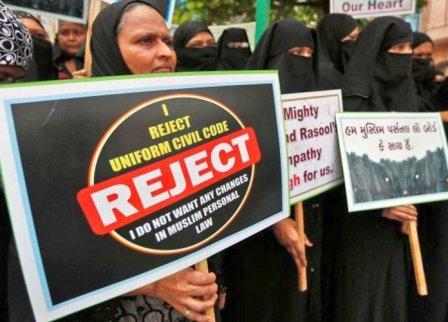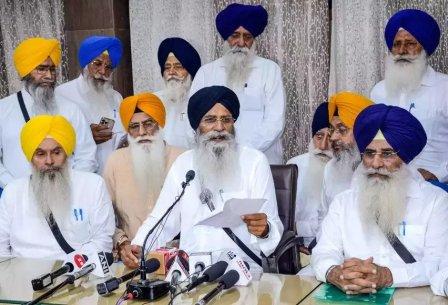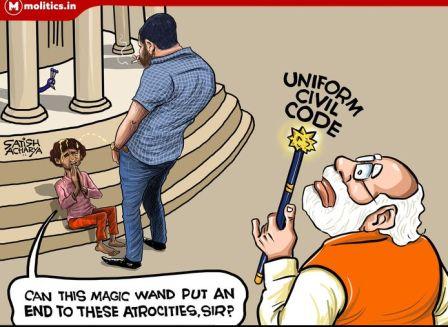
By Dr Narender Nagarwal & Mohd Naushad Khan
THE LAW COMMISSION OF INDIA made the decision on June 14 to ask the public for opinions and suggestions regarding the Uniform Civil Code (UCC). Following a brief pause of only five years, during which the Commission had come to the conclusion that the UCC is “neither necessary nor desirable,” the current action serves to maintain the heat on one of India’s most divisive political and ideological issues.
It is far from common understanding that why the government places such a high priority on the Uniform Civil Code (UCC) but not on caste-based violence, turmoil in North East region, the precarious federal system or the historically low Centre-State relations. It appears that the Uniform Civil Code’s (UCC) goal is not merely to foster equality rather to widen more religious divisions, animosity and distrust between the State and Minorities.
One constitutional limitation is that in Nagaland even the Uniform criminal laws are not applicable then how can we think of implementing Uniform Civil Code? Any attempt to create and impose uniformity over and above diversity without any consensus among stakeholders which has been the guiding principle of our constitution on UCC is more likely to boomerang.
 The very attempt by the government on UCC appears to be more political than social welfare. Prime Minister Narender Modi has already raised the political pitch on UCC and many political experts believe that it is going to be the masterstroke of the BJP ahead of 2024.
The very attempt by the government on UCC appears to be more political than social welfare. Prime Minister Narender Modi has already raised the political pitch on UCC and many political experts believe that it is going to be the masterstroke of the BJP ahead of 2024.
The Centre has not had enough time during the last nine years of the Modi administration to develop a consensus on UCC with all parties. As the general election draws near, it is clear that the UCC manoeuvre was only intended to polarise society along religious lines ahead of the election.
The Uniform Civil Code (UCC) is not always a bad concept. However, in a multi-racial and multi-religious nation like India, it might not be the greatest choice. A uniform set of personal law for the citizens might be advantageous in homogeneous society but certainly not appropriate to a heterogeneous society.
Please remember that in United States all states have their own personal laws and US Congress has never made any attempt to impose one set of law on all regional governments. The UCC needs to be focused on achieving gender-just laws within religious and cultural communities, sort of stimulating the idea of “reforms from within,” for it to be effective.
To ensure that the State is protecting the safety and dignity of minorities, the laws must have the authority to supersede personal laws and rules. Communities may be challenged to rationalise their local laws in light of the constitutional principles of justice, equity, and morality.
In the absence of any draft of proposed UCC, it would be difficult to make a final point about this contentious legislation. The spine of controversy revolving around the Uniform Civil Code has been the secular character of the nation and the freedom of religion enumerated in the Constitution of India.
The idea of a Common Civil Code is also against the very spirit of secularism which is one of the essential features of the Indian Constitution. The preamble of the Constitution states that India is a “secular democratic republic”. This means that not only there is no State religion but also State equally respects all religions which is also an important component of secularism. A secular State shall neither discriminate against anyone on the ground of religion nor interfere in the religious affairs of the communities.

The general argument placed in favour of the UCC is that the proposed legislation would eliminate all gender-based discrimination. A chunk of loyal media outlets has demanded uniformity of personal laws to curtail gender-based discrimination in Muslim communities.
Undeniably, there are some gender-based inequalities in the Muslim community; however, strictly implementing the Uniform Civil Code is not a viable solution. In the peculiar circumstances of diverse India, uniformity in personal laws can be achieved only gradually and through judicial pronouncements.
It would be better if the government push the Muslims Law into a codified law for better judicial clarity and defeat malicious attempt of misinterpretation of the Islamic principles. In seventy-two years of the post-Constitution era, all sorts of people have indeed said all sorts of things about a Uniform Civil Code – truth, falsified, self-contradictory, imaginary, and even based on misconceptions or misinformation. The judicial stand too has not been uniform concerning this issue.
The Uniform Civil Code is also opposed by the All India Muslim Personal Law Board (AIMPLB). Muslim religious leaders and scholars have issued a statement through AIMPLB asking the government to abandon its plan on UCC.
They have also asked the Muslim community to respond to the Law Commission’s proposals and make it clear that the UCC is unacceptable.

The largest Sikh organisation, the Shiromani Gurdwara Parbandhak Committee (SGPC), has also voiced objection to the UCC. The SGPC contends that the UCC would undermine the distinct identities of the nation’s minority communities.
There is no need for the UCC in the nation, according to members speaking at the executive committee meeting on Saturday, July 8, which was presided over by SGPC President Harjinder Singh Dhami said that there is no need for the UCC in the country as the constitution recognizes the principle of “unity in diversity.”
Before arguing about implementing the Uniform Civil Code throughout India we must acknowledge the sheer diversity of India in a multi-cultural, multi-linguistic and multi-religious society.
Each community, caste and religious society has its own set of law, customs and norm which deals with family relations. There is no uniformity among different Indian societies regarding their family relations, personal laws and other civil matters. It may be crucial to note that even criminal procedure law is different in state to state due to come under Concurrent List.
Similarly, the personal law is also under the Concurrent List, hence States have larger says in the matter of personal law reforms not the union government. The issue of the Uniform Civil Code has been widely highlighted by the Supreme Court through its various judgments. Conveniently a section of the political class has raised the issue of uniformity of personal law to settle their own vested interests and they tried hard to polarize the society on communal lines.
It must be accepted that any talks of a Uniform Civil Code, in the absence of uniformity in most of the other laws prevailing in the country, are absurd. It may be surprising to know that even the Criminal Procedure Code 1973 and the Civil Procedure Code 1908 are not uniform throughout the country as they have been amended and modified by various State Governments.
 Herein are a few points about reform in Personal Law: The Goa Civil Code 1867 is a prominent example of separate personal law which governs all Goans irrespective of religion, ethnicity, or linguistic affiliation.
Herein are a few points about reform in Personal Law: The Goa Civil Code 1867 is a prominent example of separate personal law which governs all Goans irrespective of religion, ethnicity, or linguistic affiliation.
The Goa Civil Code 1867 (Goa Family Law) was based on the Portuguese Civil Code 1867 and was retained in Goa after the merger with the Indian union in 1961. To quote another example, Section 118 of the Indian Succession Act 1925 was struck down by the Supreme Court as unconstitutional for being unfair to Christians.
Yet, Hindu Undivided Families continue to enjoy tax benefits in India which are not available to the other communities. It is unexplainable why the supporters of a Uniform Civil Code do not call for a uniform fiscal code.
It must be answered whether the impending reforms will also reform or abolish the special status enjoyed by the Goan people retaining their own Portuguese Civil Code. Hence, the proposed UCC would also eliminate the Goan Civil Code which applies on all people of the Goa?
A comparative study of the personal laws of Hindus, Muslims and other minorities will reveal that the sheer diversity of these laws, coupled with the dogmatic zeal with which they are adhered to, cannot permit uniformity of any sort.
The heterogeneity of the Hindu law itself is such that even the possibility of a uniform Hindu code is ruled out. Considering marriage alone, under the Hindu Marriage Act 1955, marriages may be solemnized in accordance with the rites and ceremonies of a variety of people who come under the definition of a ‘Hindu’.
 For instance, according to the saptapadi form of marriage, followed mostly in northern India, the marriage is complete and binding when the bridegroom and the bride take seven steps in front of the sacred fire. On the other hand, in South Indian societies, the suyamariyathai and seerthiruththa forms of marriage are followed frequently.
For instance, according to the saptapadi form of marriage, followed mostly in northern India, the marriage is complete and binding when the bridegroom and the bride take seven steps in front of the sacred fire. On the other hand, in South Indian societies, the suyamariyathai and seerthiruththa forms of marriage are followed frequently.
Under the later forms, a marriage is valid if the parties to the marriage declare in the presence of relatives that they are marrying each other or if they garland each other or if they put a ring on each other’s finger or if the bridegroom ties a thali (Mangalsutra) around the neck of the bride.
In the southern part of India, the concept of Sapinda relation has no relevance and marriages frequently take place within the so-called prohibited degree of the Sapinda concept. There is no condition of saptapadi before the sacred fire in the Hindu marriages in southern societies which is one of the important rituals in northern India.
Also, for a marriage to be valid under Hindu law, it has to be solemnized in accordance with the customary rites and ceremonies of at least one of the parties. Thus, if a Jain marries a Buddhist by performing the rites of a Sikh; the marriage is void, [Shakuntala v. Nilkantha].
Henceforth, it is wrong to suggest that the entire Hindu community follow uniform personal laws. There isn’t a single legislation that applies to all Hindus in the nation. For example, the marriage between the two Hindus under the Hindu Marriage Act of 1955 forbids marriages between close relatives; however in some parts of south India, it is seen as usual.
These many practices are recognised by the Hindu Code Bill. The issue herein is the proposed reform in personal laws also abolishes the marriages practices, customs, and religious rituals in southern parts of India?
 In some of the Northeast states where tribal population in substantive numbers and State like Jharkhand, Madhya Pradesh, Chhattisgarh the tribal communities have their own personal laws that apply to marriages, divorce, adoption, inheritance and other family matters. It is unclear whether the new proposed reforms of UCC would also apply to the Northeast region and tribal belts of India and eliminate their personal laws?
In some of the Northeast states where tribal population in substantive numbers and State like Jharkhand, Madhya Pradesh, Chhattisgarh the tribal communities have their own personal laws that apply to marriages, divorce, adoption, inheritance and other family matters. It is unclear whether the new proposed reforms of UCC would also apply to the Northeast region and tribal belts of India and eliminate their personal laws?
The application of personal laws is not the same for Christians and Muslims of the tribal region of North East. Since majority of tribal communities have their own set of law which are different within the population of the state? The Nagaland regional customs are safeguarded by the Constitution of India itself.
Similarly, the Meghalaya and Mizoram states enjoy safeguards of their personal laws under the Constitution of India. The proposed UCC must address the apprehension of the tribal communities of the north east states and other parts of the country including the whether they will continue their constitutional protection.
As Muslim law deals with two separate sets of laws for the Sunni and the Shia community, whether the proposed reforms in the name of UCC also undertake the two different personal laws? It is undefined whether the proposed Uniform Civil Code initiated by the Law Commission of India would have provisions of community-specific law or not.
The marriage, divorce and other personal matters of Sunni and Shia are altogether different and there is no clarity on how to reconcile these issues through Uniform Civil Code. In so far as Muslim law is concerned though there are no elaborate rites or ceremonies, there exist some differences between Sunni and Shia marriages.
It is really weird that the government is anxious to enact law that will give substance to Article 44, which is essentially a directive principle that cannot be implemented through the judiciary now pushing through legislative way.
 It’s amazing how the government has maintained a complete silence about why there are so many disparities in living wages, the elimination of pay differences in the private sector, sexual harassment in the private sector, caste-based violence against SC/ST community members, equal pay for equal work issue, early childhood care issue, raising standards for nutrition and public health, and other issues.
It’s amazing how the government has maintained a complete silence about why there are so many disparities in living wages, the elimination of pay differences in the private sector, sexual harassment in the private sector, caste-based violence against SC/ST community members, equal pay for equal work issue, early childhood care issue, raising standards for nutrition and public health, and other issues.
In fact, despite the fact that Article 47 prohibits intoxicating beverages in language identical to that of Article 44, everyone rejected the Supreme Court’s decision to only forbid the sale of alcohol (not its consumption) within 500 metres of a roadway. This seems to be hypocrisy, why no law on other subject mentioned in Directive Principles of State Policy under the Constitution of India.
Considering the above, it is humbly prayed to not rush for any reforms in the personal laws and any attempt to operationalize the Uniform Civil Code would hurt the sentiments of minorities, Dalits, tribes, and southern Indian communities. It may also create unnecessary disharmony in society and the nation must focus on education, employment, health, rural development, housing and strengthening the national economy. ![]()
Dr Narender Nagarwal teaches law at Delhi University and Mohd Naushad Khan is a Sub-Editor with Radiance Views weekly.
___________
Also Read:
Drug Menace Cannot Be Addressed Without Addressing the Root Cause of Supply Chain
Deliberate Destruction of Indian Railways
Mughal Gardens – Name Changed, But Why?
Will SC Order Be Implemented When There Is Political Patronage For Hate Speech?
Time to build on synergy of ground energy & politics
Punjab – How a deadly cocktail of Agri-Water-Energy nexus going to destroy it?
Disclaimer : PunjabTodayTV.com and other platforms of the Punjab Today group strive to include views and opinions from across the entire spectrum, but by no means do we agree with everything we publish. Our efforts and editorial choices consistently underscore our authors’ right to the freedom of speech. However, it should be clear to all readers that individual authors are responsible for the information, ideas or opinions in their articles, and very often, these do not reflect the views of PunjabTodayTV.com or other platforms of the group. Punjab Today does not assume any responsibility or liability for the views of authors whose work appears here.
Punjab Today believes in serious, engaging, narrative journalism at a time when mainstream media houses seem to have given up on long-form writing and news television has blurred or altogether erased the lines between news and slapstick entertainment. We at Punjab Today believe that readers such as yourself appreciate cerebral journalism, and would like you to hold us against the best international industry standards. Brickbats are welcome even more than bouquets, though an occasional pat on the back is always encouraging. Good journalism can be a lifeline in these uncertain times worldwide. You can support us in myriad ways. To begin with, by spreading word about us and forwarding this reportage. Stay engaged.
— Team PT


Copyright © Punjab Today TV : All right Reserve 2016 - 2024 |